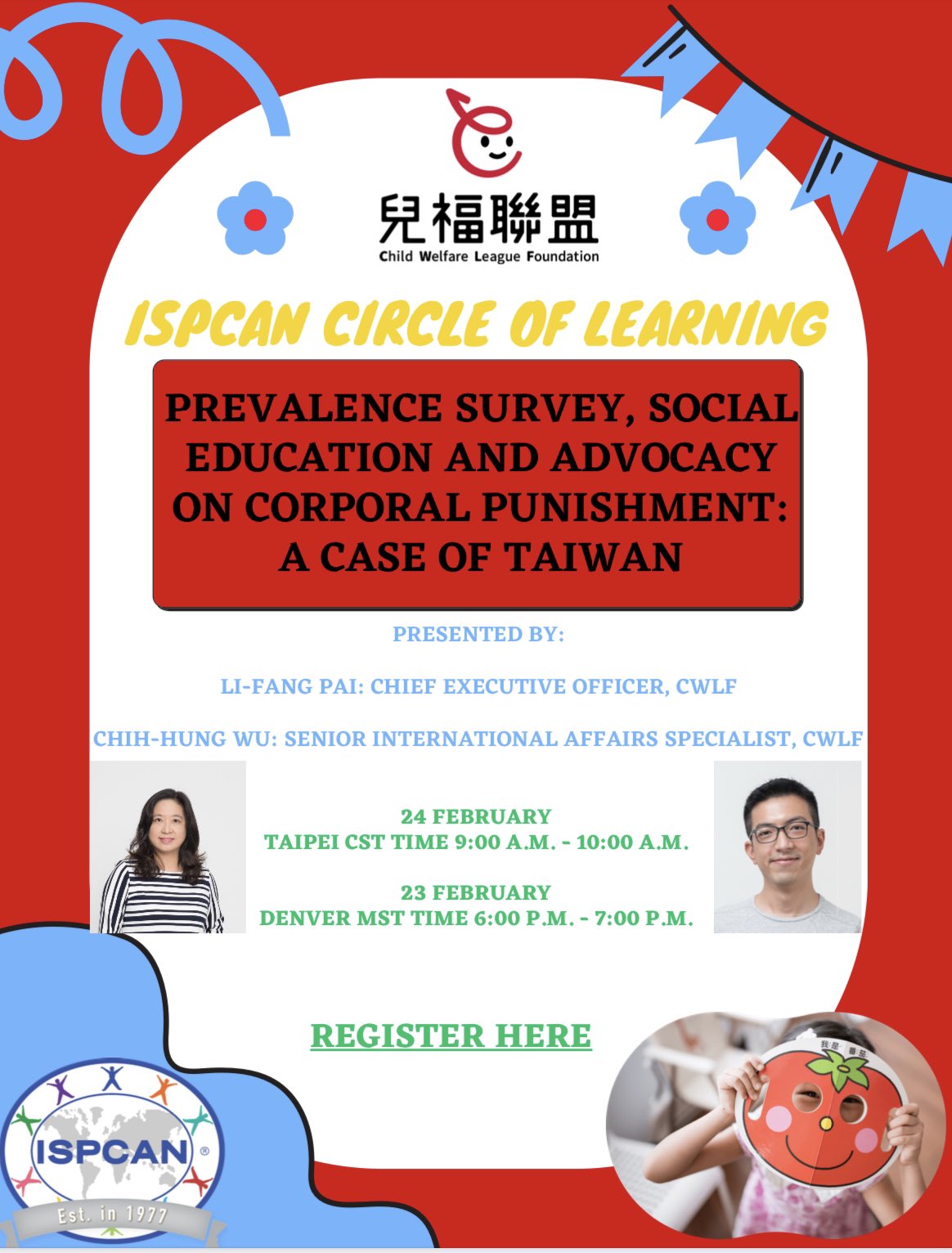
Prevalence Survey, Social Education and Advocacy on Corporal Punishment: A Case of Taiwan
On 24 February 2022, Child Welfare League Foundation (CWLF) was happy to lead a Circle of Learning event titled Prevalence Survey, Social Education and Advocacy on Corporal Punishment: A Case of Taiwan hosted by The International Society for the Prevention of Child Abuse & Neglect (ISPCAN). In this event, Li-Fang Pai, CEO of CWLF, and Chih-Hung Wu, Senior International Specialist of CWLF, closely examined corporal punishment (CP) issue in Taiwan with three different approaches: what are the existing CP policies and regulations in Taiwan, what the research told us, and what CWLF as a child-focused organization has done to prompt social changes.
In Taiwan, currently corporal punishment is banned in most school settings, but CP is still common in Taiwanese home settings. In terms of CP related laws in Taiwan, Civil Code Article 1085 stipulates that “Parents may, within the limit of necessity, inflict punishment upon their children,” which creates a grey area often used to justify Taiwanese parents’ act to conduct corporal punishment or to authorize a third party to inflict corporal punishment on children..png)
According to our 2018 survey [1], 63.0% corporal punishment incidents took place in home settings, while 15.7% respondents had experienced severe corporal punishment. When we asked children if they think corporal punishment is a good way to discipline children when they misbehave, 85.6% disagreed. While corporal punishment may elicit anticipated reactions on children like admitting mistakes and changing behaviors, it also leads to a wide range of negative reactions such as feeling unconvinced and angry, thoughts of self-harm, thoughts of using violence, etc. In our 2020 retrospective survey on adults about their past experiences of corporal punishment[2], 92.5% adult respondents said that they had experienced corporal punishment from their parents; 87.1% had been hit; 58.0% had been hit and left small injuries; 3.7% were hit so severely that they needed to be hospitalized.

In this 2020 survey we also found that there was a grey area of Taiwanese people’s understanding of corporal punishment. 35.1% respondents answered that hitting body without causing injuries is not corporal punishment. 30.1% answered that withholding food from child as punitive measure should not be defined as a form of corporal punishment. 50.9% do not think asking children to stand and face the wall for a punishment should be considered a form of corporal punishment. Also 59.8% respondents do not think asking children to write something as a punishment (e.g., copying texts, write corrections for 100 times) should be considered an act of corporal punishment. There was no consensus among Taiwanese public on disciplines that cause slight or no physical harms on children.

Furthermore, when we asked the adults about their attitudes toward using corporal punishment as a way to discipline children, 60.2% respondents did not agree with eliminating corporal punishment in all settings, while 39.6% agreed that corporal punishment is necessary in childrearing, and 31.0% agreed corporal punishment is a relatively effective way of discipline. It is clear that corporal punishment is still a hot topic with supporters on each side.
As a child welfare organization dedicating to safeguard children against all forms of violence, abuse and neglect, CWLF recognizes the need of law reform and norm change to eliminate corporal punishment in all settings in Taiwan. Therefore, in 2011 we launched annual Orange Ribbon | Love Children Zero Violence Initiatives, with the aim to educate the public about the long-term effect of corporal punishment on children and help caregivers learn positive and non-violent parenting skills. For caregivers in need of support, we set up a parenting helpline to assist them in solving parenting problems they encountered in daily life. We held press conferences to publish our annual survey results and call for actions. We produced various parenting guidance materials including videos or interactive websites to disseminate positive parenting concepts. Moreover, we collaborated with celebrities and did media promotion on television to maximize our influence and share the importance of non-violent positive parenting. It is our hope that through our research and advocacy work over the years, social norms and legislations can be shifted and children in Taiwan can be protected from all forms of violence including corporal punishment.
[1] "Survey of Corporal Punishment of Children by Parents in Taiwan" conducted from May 21 to June 30, 2018 on 5th, 6th, 7th, 8th graders around Taiwan. We received 1,571 responses.


